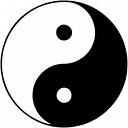Origins of Tai Qi (Tai Chi)
Tai chi is said to have been founded as early as Long Fist of Hsa Suan Ming (618-905, Tang Dynasty) based on combining martial arts with Taoist and Buddhist philosophy.
Modern taichi is documented from the 12th century through the legendary Zhang San Feng. The Chen style was founded through Cheng Wang Ting and the Yang style was developed through Yang Lu Chan in the 18th century through to Yang Cheng Fu in the 20th Century.
My master (Raymond Chung) studied under Yang Cheng Fu's son, Yang Shou Chung and escaped from Mao's communist China by swimming to Hong Kong and eventually brought the teaching to Vancouver BC, Canada.
Philosophy of Tai Qi (Tai Chi)
Tai chi is based on the principles of Yin and Yang or a balance in the universe and hence this symbol also means Tai Chi. Tai chi is an internal martial art form which focuses on the use of our internal energy or "chi" as opposed to external forms, which utilize physical energy and endurance to overcome the opponent.
In everything in our lives there must be a balance. We know if we overdo anything, we often suffer consequences on the other side. Realizing and understanding of this balance is elusive. Tai Chi gives us a way to experience this through its practice and then we can apply it to the rest of our lives. In our work, in our personal relationships, in our play, in our diets, in fact in absolutely everything we in our lives.
Tai Chi for Health
Tai chi can be used as a preventive health measure, as a way to maintain good health, or to help with a specific ailment. While tai chi cannot cure disease, it is often recommended as a complementary therapy to conventional treatment. Specifically, tai chi can be used to help:
- Arthritis. By strengthening the muscles surrounding an arthritic joint and improving flexibility, tai chi increases range of motion without causing pain. Although tai chi cannot treat bone and cartilage damage caused by arthritis, it can lessen the severity and pain of the disease when started early enough.
- Balance. Research shows that practicing tai chi improves balance in older people and thus reduces the risk of falling - a major cause of death and disability in the elderly.
- Circulation problems. Tai chi may enable the heart to pump more blood with each beat, thereby improving circulation.
- High blood pressure. A recent study done at Johns Hopkins Medical Institutions revealed that tai chi lowered blood pressure almost as much as moderate-intensity aerobic exercise in older adults who had been sedentary.
- Multiple sclerosis. Preliminary studies suggest that tai chi helps people with MS to increase their physical functioning as well as their mental well-being.
- Stress. Although the evidence is limited, some studies have shown that tai chi is as effective as meditation and walking for reducing the amount of stress hormones in the body.
- Psychological. Through Tai Chi's use of diaphragmatic breathing and focused meditation, this form of exercise has a relaxing effect on the individual. There has been scientific evidence showing that practitioners show improvements in self-esteem, self-confidence, sleep and mental health (depression, anxiety, etc.)
- Neurologic. The slow continuous movements of Tai Chi benefit the neurologic system by causing tonal decreases in much of the same way as proprioceptive neuromuscular facilitation (PNF).
- Musculoskeletal. Improvements in posture, strength and flexibility have been attributed to Tai Chi among those individual who practice the exercise. Its slow circular movements allow for gentle stretching of muscles, tendons and ligaments and are often compared to continuous passive movement which is used to increase the speed of healing.
- Digestive Researchers have found Tai Chi to be effective in improving conditions such as duodenal ulcers, lack of appetite, stomach pain and prolapsed stomach. It is believed that the "visceral massage effect" of some of the movements also assists in improving elimination.
- Endocrine. The physical activity of Tai Chi has been associated with decreases in cortisol levels within the body, thereby decreasing mood disturbances. Tai Chi also causes an increase in the secretion of noradrenaline from the sympathetic nervous system which also aids in causing a physical relaxation
|

